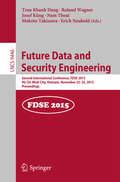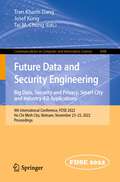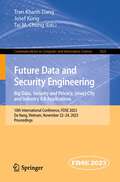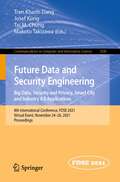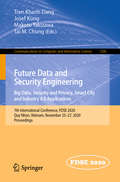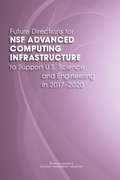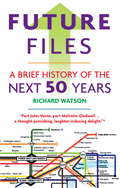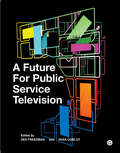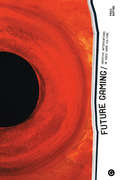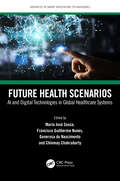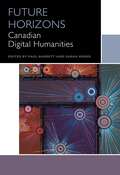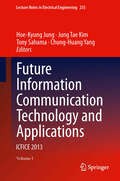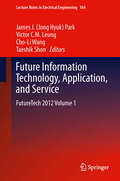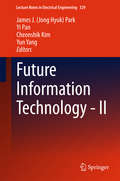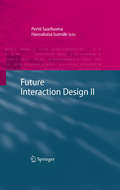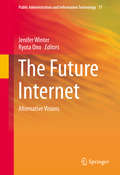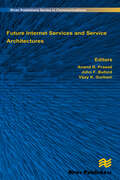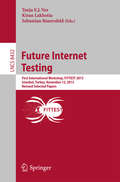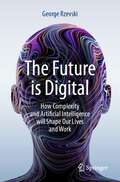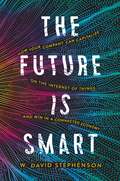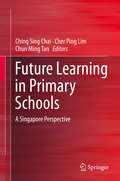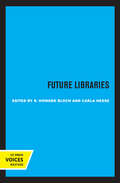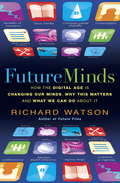- Table View
- List View
Future Data and Security Engineering
by Josef Küng Roland Wagner Tran Khanh Dang Nam Thoai Erich Neuhold Makoto TakizawaThis book constitutes the refereed proceedings of the Second International Conference on Future Data and Security Engineering, FDSE 2015, held in Ho Chi Minh City, Vietnam, in November 2015. The 20 revised full papers and 3 short papers presented were carefully reviewed and selected from 88 submissions. They have been organized in the following topical sections: big data analytics and massive dataset mining; security and privacy engineering; crowdsourcing and social network data analytics; sensor databases and applications in smart home and city; emerging data management systems and applications; context-based analysis and applications; and data models and advances in query processing.
Future Data and Security Engineering. Big Data, Security and Privacy, Smart City and Industry 4.0 Applications: 9th International Conference, FDSE 2022, Ho Chi Minh City, Vietnam, November 23–25, 2022, Proceedings (Communications in Computer and Information Science #1688)
by Tran Khanh Dang Josef Küng Tai M. ChungThis book constitutes the refereed proceedings of the 9th International Conference on Future Data and Security Engineering, FDSE 2022, held in Ho Chi Minh City, Vietnam, during November 23–25, 2022. The 41 full papers(including 4 invited keynotes) and 12 short papers included in this book were carefully reviewed and selected from 170 submissions. They were organized in topical sections as follows: invited keynotes; big data analytics and distributed systems; security and privacy engineering; machine learning and artificial intelligence for security and privacy; smart city and industry 4.0 applications; data analytics and healthcare systems; and security and data engineering.
Future Data and Security Engineering. Big Data, Security and Privacy, Smart City and Industry 4.0 Applications: 10th International Conference, FDSE 2023, Da Nang, Vietnam, November 22–24, 2023, Proceedings (Communications in Computer and Information Science #1925)
by Tran Khanh Dang Josef Küng Tai M. ChungThis book constitutes the proceedings of the 10th International Conference on Future Data and Security Engineering. Big Data, Security and Privacy, Smart City and Industry 4.0 Applications, FDSE 2023, held in Da Nang, Vietnam, during November 22–24, 2023.The 38 full papers and 8 short papers were carefully reviewed and selected from 135 submissions. They were organized in topical sections as follows: big data analytics and distributed systems; security and privacy engineering; machine learning and artificial intelligence for security and privacy; smart city and industry 4.0 applications; data analytics and healthcare systems; and short papers: security and data engineering.
Future Data and Security Engineering. Big Data, Security and Privacy, Smart City and Industry 4.0 Applications: 8th International Conference, FDSE 2021, Virtual Event, November 24–26, 2021, Proceedings (Communications in Computer and Information Science #1500)
by Tran Khanh Dang Josef Küng Tai M. Chung Makoto TakizawaThis book constitutes the proceedings of the 8th International Conference on Future Data and Security Engineering, FDSE 2021, held in Ho Chi Minh City, Vietnam, in November 2021.*The 28 full papers and 8 short were carefully reviewed and selected from 168 submissions. The selected papers are organized into the following topical headings: big data analytics and distributed systems; security and privacy engineering; industry 4.0 and smart city: data analytics and security; blockchain and access control; data analytics and healthcare systems; and short papers: security and data engineering.* The conference was held virtually due to the COVID-19 pandemic.
Future Data and Security Engineering. Big Data, Security and Privacy, Smart City and Industry 4.0 Applications: 7th International Conference, FDSE 2020, Quy Nhon, Vietnam, November 25–27, 2020, Proceedings (Communications in Computer and Information Science #1306)
by Tran Khanh Dang Josef Küng Makoto Takizawa Tai M. ChungThis book constitutes the proceedings of the 7th International Conference on Future Data and Security Engineering, FDSE 2019, held in Quy Nhon, Vietnam, in November 2020.*The 29 full papers and 8 short were carefully reviewed and selected from 161 submissions. The selected papers are organized into the following topical headings: big data analytics and distributed systems; security and privacy engineering; industry 4.0 and smart city: data analytics and security; data analytics and healthcare systems; machine learning-based big data processing; emerging data management systems and applications; and short papers: security and data engineering. * The conference was held virtually due to the COVID-19 pandemic.
Future Directions for NSF Advanced Computing Infrastructure to Support U.S. Science and Engineering in 2017-2020
by National Academies of Sciences Engineering MedicineAdvanced computing capabilities are used to tackle a rapidly growing range of challenging science and engineering problems, many of which are compute- and data-intensive as well. Demand for advanced computing has been growing for all types and capabilities of systems, from large numbers of single commodity nodes to jobs requiring thousands of cores; for systems with fast interconnects; for systems with excellent data handling and management; and for an increasingly diverse set of applications that includes data analytics as well as modeling and simulation. Since the advent of its supercomputing centers, the National Science Foundation (NSF) has provided its researchers with state-of-the-art computing systems. The growth of new models of computing, including cloud computing and publically available by privately held data repositories, opens up new possibilities for NSF. In order to better understand the expanding and diverse requirements of the science and engineering community and the importance of a new broader range of advanced computing infrastructure, the NSF requested that the National Research Council carry out a study examining anticipated priorities and associated tradeoffs for advanced computing. Future Directions for NSF Advanced Computing Infrastructure to Support U.S. Science and Engineering in 2017-2020 provides a framework for future decision-making about NSF’s advanced computing strategy and programs. It offers recommendations aimed at achieving four broad goals: (1) position the U.S. for continued leadership in science and engineering, (2) ensure that resources meet community needs, (3) aid the scientific community in keeping up with the revolution in computing, and (4) sustain the infrastructure for advanced computing.
Future Files
by Richard WatsonFuture Files is filled with provocative forecasts about how the world might change in the next half century. It examines emerging trends and developments in society, technology, economy, and business, and makes educated speculations as to where they might take us.
A Future for Public Service Television (Goldsmiths Press Ser.)
by Edited by Des Freedman Vana GoblotA guide to the nature, purpose, and place of public service television within a multi-platform, multichannel ecology.Television is on the verge of both decline and rebirth. Vast technological change has brought about financial uncertainty as well as new creative possibilities for producers, distributors, and viewers. This volume from Goldsmiths Press examines not only the unexpected resilience of TV as cultural pastime and aesthetic practice but also the prospects for public service television in a digital, multichannel ecology. The proliferation of platforms from Amazon and Netflix to YouTube and the vlogosphere means intense competition for audiences traditionally dominated by legacy broadcasters. Public service broadcasters—whether the BBC, the German ARD, or the Canadian Broadcasting Corporation—are particularly vulnerable to this volatility. Born in the more stable political and cultural conditions of the twentieth century, they face a range of pressures on their revenue, their remits, and indeed their very futures. This book reflects on the issues raised in Lord Puttnam's 2016 Public Service TV Inquiry Report, with contributions from leading broadcasters, academics, and regulators. With resonance for students, professionals, and consumers with a stake in British media, it serves both as historical record and as a look at the future of television in an on-demand age.Contributors includeTess Alps, Patrick Barwise, James Bennett, Georgie Born, Natasha Cox, Gunn Enli, Des Freedman, Vana Goblot, David Hendy, Jennifer Holt, Amanda D. Lotz, Sarita Malik, Matthew Powers, Lord Puttnam, Trine Syvertsen, Jon Thoday, Mark Thompson
Future Gaming: Creative Interventions in Video Game Culture (Goldsmiths Press / Future Media Series)
by Paolo RuffinoA sophisticated critical take on contemporary game culture that reconsiders the boundaries between gamers and games.This book is not about the future of video games. It is not an attempt to predict the moods of the market, the changing profile of gamers, the benevolence or malevolence of the medium. This book is about those predictions. It is about the ways in which the past, present, and future notions of games are narrated and negotiated by a small group of producers, journalists, and gamers, and about how invested these narrators are in telling the story of tomorrow.This new title from Goldsmiths Press by Paolo Ruffino suggests the story could be told another way. Considering game culture, from the gamification of self-improvement to GamerGate's sexism and violence, Ruffino lays out an alternative, creative mode of thinking about the medium: a sophisticated critical take that blurs the distinctions among studying, playing, making, and living with video games. Offering a series of stories that provide alternative narratives of digital gaming, Ruffino aims to encourage all of us who study and play (with) games to raise ethical questions, both about our own role in shaping the objects of research, and about our involvement in the discourses we produce as gamers and scholars. For researchers and students seeking a fresh approach to game studies, and for anyone with an interest in breaking open the current locked-box discourse, Future Gaming offers a radical lens with which to view the future.
Future Health Scenarios: AI and Digital Technologies in Global Healthcare Systems (Advances in Smart Healthcare Technologies)
by Maria José Sousa Francisco Guilherme Nunes Generosa Do Nascimento Chinmay ChakrabortyDigital technologies is a major emerging area to invest and research in new models of health management. Future health scenarios are constituted by technologies in health and clinical decision-making systems. This book provides a unique multidisciplinary approach for exploring the potential contribution of AI and digital technologies in enabling global healthcare systems to respond to urgent twenty-first-century challenges. Deep analysis has been made regarding telemedicine using big data, deep learning, robotics, mobile and remote applications. Features: Focuses on prospective scenarios in health to predict possible futures. Addresses the urgent needs of the key population, socio-technical and health themes. Covers health innovative practices as 3D models for surgeries, big data to treat rare diseases, and AI robot for heart treatments. Explores telemedicine using big data, deep learning, robotics, mobile and remote applications. Reviews public health based on predictive analytics and disease trends. This book is aimed at researchers, professionals, and graduate students in computer science, artificial intelligence, decision support, healthcare technology management, biomedical engineering, and robotics.
Future Horizons: Canadian Digital Humanities (Canadian Literature Collection)
by Dean Irvine Kiera Obbard Sandra Djwa Roopika Risam Andrea Zeffiro Deanna Fong M Ryan Fitzpatrick Gregory Betts M Eric Schmaltz Dani Spinosa Klara Du Plessis M David Gaertner M Mark V. Campbell M Jon Saklofske Julia Polyck-O’Neill Kim Martin Rashmeet Kaur Pascale Dangoisse Constance Crompton Michelle Schwartz Katherine McLeod Graham H. Jensen M Allan Cho Sarah Zhang Kendra Cowley Susan Brown Asen IvanovAu fil des vingt et quelques chapitres que compte cet ouvrage, les auteurs explorent le passé, le présent et l’avenir de la recherche, de l’enseignement et de l’expérimentation en sciences humaines numériques au Canada. Ce recueil, qui rassemble les travaux de chercheuses et de chercheurs établis et émergents, présente des initiatives contemporaines dans le domaine des sciences humaines numériques. Celles-ci sont conjuguées à un réexamen de l’héritage légué par ce domaine jusqu’à ce jour et à des discussions sur son potentiel. Future Horizons jette aussi un regard historique sur des projets numériques d’envergure, quoique largement méconnus, qui ont été réalisés au Canada. Future Horizons fait plonger le lecteur dans des projets qui mettent à contribution une vaste gamme d’approches — des jeux numériques aux laboratoires ouverts, des archives sonores à la poésie numérique, des arts visuels à l’analyse textuelle numérique — et qui puisent dans des matériaux canadiens tant historiques que contemporains. Dans leurs essais, les auteurs font voir comment une telle diversité d’approches remet en cause la connaissance en permettant aux chercheurs de poser de nouvelles questions.Ce recueil remet en question l’idée selon laquelle il n’existerait qu’une seule définition des sciences humaines numériques ou une seule identité collective nationale. En observant les interactions du numérique avec la race, l’autochtonie, le genre et la sexualité — sans oublier l’histoire, la poésie et le concept de nation —, Future Horizons propose une vue élargie du travail à l’intersection des sciences humaines numériques et des sciences humaines traditionnelles dans le Canada d’aujourd’hui. Ce livre est publié en anglais.Formats disponibles : couverture souple, PDF accessible et ePub accessible.
Future Information Communication Technology and Applications: ICFICE 2013
by Chung-Huang Yang Hoe-Kyung Jung Jung Tae Kim Tony SahamaThese proceedings are based on the 2013 International Conference on Future Information & Communication Engineering (ICFICE 2013), which will be held at Shenyang in China from June 24-26, 2013. The conference is open to all over the world, and participation from Asia-Pacific region is particularly encouraged. The focus of this conference is on all technical aspects of electronics, information, and communications ICFICE-13 will provide an opportunity for academic and industry professionals to discuss the latest issues and progress in the area of FICE. In addition, the conference will publish high quality papers which are closely related to the various theories and practical applications in FICE. Furthermore, we expect that the conference and its publications will be a trigger for further related research and technology improvements in this important subject.
Future Information Technology, Application, and Service
by Cho-Li Wang James Jong Park Taeshik Shon Victor C.M. LeungThis book is proceedings of the 7th FTRA International Conference on Future Information Technology (FutureTech 2012). The topics of FutureTech 2012 cover the current hot topics satisfying the world-wide ever-changing needs. The FutureTech 2012 is intended to foster the dissemination of state-of-the-art research in all future IT areas, including their models, services, and novel applications associated with their utilization. The FutureTech 2012 will provide an opportunity for academic and industry professionals to discuss the latest issues and progress in this area. In addition, the conference will publish high quality papers which are closely related to the various theories, modeling, and practical applications in many types of future technology. The main scope of FutureTech 2012 is as follows. Hybrid Information Technology Cloud and Cluster Computing Ubiquitous Networks and Wireless Communications Multimedia Convergence Intelligent and Pervasive Applications Security and Trust Computing IT Management and Service Bioinformatics and Bio-Inspired Computing Database and Data Mining Knowledge System and Intelligent Agent Human-centric Computing and Social Networks The FutureTech is a major forum for scientists, engineers, and practitioners throughout the world to present the latest research, results, ideas, developments and applications in all areas of future technologies.
Future Information Technology - II
by James J. Jong Hyuk Park Yi Pan Cheonshik Kim Yun YangThe new multimedia standards (for example, MPEG-21) facilitate the seamless integration of multiple modalities into interoperable multimedia frameworks, transforming the way people work and interact with multimedia data. These key technologies and multimedia solutions interact and collaborate with each other in increasingly effective ways, contributing to the multimedia revolution and having a significant impact across a wide spectrum of consumer, business, healthcare, education, and governmental domains. This book aims to provide a complete coverage of the areas outlined and to bring together the researchers from academic and industry as well as practitioners to share ideas, challenges, and solutions relating to the multifaceted aspects of this field.
Future Intelligent Vehicular Technologies: First International Conference, Future 5V 2016, Porto, Portugal, September 15, 2016, Revised Selected Papers (Lecture Notes of the Institute for Computer Sciences, Social Informatics and Telecommunications Engineering #185)
by Joaquim Ferreira Muhammad AlamThis book constitutes the refereed proceedings of the First International Conference on Future Intelligent Vehicular Technologies, Future 5V 2016, held in Porto, Portugal, in September 2016. Future 5V presents vehicular networks and communications and also hosted the “Internet of Things (IoT) meets Big Data and Cloud Computing Workshop”. The 21 revised full papers presented were reviewed and selected from 38 submissions. The papers cover all aspects of intelligent vehicular communications including security and applications.
Future Interaction Design II
by Pertti Saariluoma Hannakaisa IsomäkiThe perspectives and techniques used in human-computer interaction design, practice and research are broadening. This book looks at emerging approaches which are likely to contribute to the discipline in near future. The underlying idea is that human character rather than technology should determine the nature of interaction. The concept of "interaction design" covers this range of concerns relevant to enabling quality design. Each chapter emphasizes alternative perspectives on interaction and new concepts to help researchers and practitioners relate to alternative design approaches and opportunities. This second volume provides a wider perspective, from both a scientific and geographic outlook. New topics, such as psychological design processes, gerotechnology, modelling, e-learning and subconscious experiences are discussed from a team of international authors. This book will be of considerable value to those seeking innovative perspectives upon designing and ensuring effective interaction between humans and technology.
The Future Internet
by Jenifer Winter Ryota OnoReaders seeking to gain a handle on the internet's global expansion will find this book rich in scholarly foundations combined with cutting-edge discussion of emerging ICTs and services and the complex societal contexts in which they are embedded. To explore possibilities to the fullest extent, a sociotechnical systems approach is employed, focusing on the interplay of technical, social, cultural, political, and economic dynamics to explore alternative futures (ones that are not part of the dominant discourse about the internet). These shared perspectives are not well addressed elsewhere in current discussions. Awareness of these dynamics, and the fluidity of the future, is important, as humankind moves forward into the uncertain future. Due to the sociotechnical complexity of the Internet, policymakers, businesspeople, and academics worldwide have struggled to keep abreast of developments. This volume's approach is intended to stimulate dialogue between academics and practitioners on a topic that will affect most aspects of human life in the near-term future.
Future Internet Services and Service Architectures (River Publishers Series In Communications Ser.)
by Anand R. Prasad John F. Buford Vijay K. GurbaniFuture Internet Services and Service Architectures presents state-of-the-art results in services and service architectures based on designs for the future Internet and related emerging networks. The discussions include technology issues, key services, business models, and security. The work describes important trends and directions. Future Internet Services and Service Architectures is intended to provide readers with a comprehensive reference for the most current developments in the field. It offers broad coverage of important topics with twenty chapters covering both technology and applications written by international experts. The 20 chapters of Future Internet Services and Service Architectures are organized into the following five sections:-• Future Internet Services -- This section contains four chapters which present recent proposals for a new architecture for the Internet, with service delivery in the Future Internet as the key focus.• Peer-to-Peer Services -- Using the P2P network overlay as a service platform, five chapters explore the P2P architecture and its use for streaming services, communication services, and service discovery.• Virtualization -- Virtualization and its benefits for resource management, supporting hetereogeneity, and isolation are the basis for five chapters which describe virtualization at the endpoint, in the cloud, and in the network.• Event-Distribution -- Publish/Subscribe mechanisms are important for applications which require time-sensitive delivery of notifications. The two chapters in this section present recent developments in publish/subscribe load balancing and in sensor networks.• VANETs - Vehicular Ad Hoc Networks (VANETs) are a network technology which are designed for vehicle-to-vehicle and vehicle-to-infrastructure connectivity for moving vehicles. The four chapters in this section provide an introduction to VANETs, routing, services and system architecture.Future Internet Services and Service Architectures is complemented by a separate volume, Advances in Next Generation Services and Service Architectures, which covers emerging services and service architectures, IPTV, context awareness, and security.
Future Internet Testing: First International Workshop, FITTEST 2013, Istanbul, Turkey, November 12, 2013, Revised Selected Papers (Lecture Notes in Computer Science #8432)
by Tanja E. J. Vos, Kiran Lakhotia and Sebastian BauersfeldThis book constitutes the proceedings of the First International Workshop on future Internet Testing, FITTEST 2013, held in Turkey, Istanbul, in November 2013, in conjunction with the International Conference on Testing Software and Systems (ICTSS).The volume presents a total of 7 contributions; 5 full papers which were selected from 8 submissions, as well as a paper on the Java Unit Test Competition and a summary of the achievements of the FITTEST project.
Future Internet Testing
by Tanja E. J. Vos Kiran Lakhotia Sebastian BauersfeldThis book constitutes the proceedings of the First International Workshop on future Internet Testing, FITTEST 2013, held in Turkey, Istanbul, in November 2013, in conjunction with the International Conference on Testing Software and Systems (ICTSS). The volume presents a total of 7 contributions; 5 full papers which were selected from 8 submissions, as well as a paper on the Java Unit Test Competition and a summary of the achievements of the FITTEST project.
The Future is Digital: How Complexity and Artificial Intelligence will Shape Our Lives and Work
by George RzevskiThis book describes in an easily accessible way how artificial intelligence (AI) will help us to overcome the ongoing rise in complexity and thus shape our lives and work in a not-too-distant future. AI has proven to be the latest tool for resolving issues created by the most recent surge in complexity, and the corollary is: those who delay or ignore AI, will be overwhelmed by complexity. The book starts with a broad description of the coevolution of technology and society that irreversibly leads to the sharp increase in complexity of our socioeconomic environment. The second chapter then covers concepts and principles of the new science of complexity which helps us to understand issues caused by socioeconomic complexity and provides methods for resolving them. Subsequently, a beginner’s guide to artificial intelligence helps readers to glance at fundamentals of this powerful technology capable of resolving issues created by socioeconomic complexity. The danger of allowing intelligent digital systems to make high-risk decisions as well as the consequences of possible misuse of AI for fraud and fake are also discussed. The following chapter explores the concepts of natural and digital ecosystems. Digital transformation of rigidly structured corporations and administrations into adaptive and evolving organisations are illustrated by a number of case studies. Next, the current hectic transition of industrial to digital society is described, its origins identified and outcomes predicted, highlighting issues created by the increase in complexity and showing how to resolve them using thinking tools such as a complexity mindset and digital tools such as artificial intelligence. Eventually, the last two chapters outline the author’s vision of the future digital economy and digital society. This book is accessible to everyone who is curious to glimpse into the future, no previous special knowledge of digital technology is required. Especially decision makers in politics, business, administration, banking, policy making, education, healthcare and defence, and their advisors will benefit from the book, as it will help them to contribute to the creation of the brave new digital world. It may also support investors to recognise which elements of digital technology will play the most important role in the near future.
The Future is Smart: How Your Company Can Capitalize on the Internet of Things--and Win in a Connected Economy
by W. David StephensonAre you ready for the IoT revolution? The Internet of Things (IoT) will soon be everywhere—embedded in interconnected devices we’ll use every day.Already, cars, appliances, and wearables transmit realtime data to improve performance . . . and new IoT products can even save your life. Consumer goods are just the tip of the iceberg. Amid projections that 30 billion smart devices will be linked in the near future, traditional companies such as Siemens, GE, and John Deere are preparing for profound changes to management, strategy, manufacturing, and maintenance. With the IoT, for example, sensors warn when a critical assembly-line part is about to break, or track how customers actually use products. Data hubs collect and share information instantly with departments, supply chains, partners, and customers— anchoring the organization and replacing hierarchies with circular systems. The Future is Smart documents the shifts now under way. Written by a leading IoT strategist, the book explains how companies are tapping technology to: Optimize supply chains • Maximize quality • Boost safety • Increase efficiency • Reduce waste • Cut costs • Revolutionize product design • Delight customers For those who are ready, the opportunities are endless. This big-think book reveals concrete actions for thriving in this new tech-enabled world.
Future Learning in Primary Schools
by Ching Sing Chai Cher Ping Lim Chun Ming TanThis edited book tells the story of the multifaceted efforts devoted by a "future school" in Singapore--The Nan Chiau Primary School--in shaping future learning. It documents the various measures implemented by one primary school to improve student learning outcomes in a technology-rich teaching and learning environment. With the current interest in Singapore's "Masterplan for ICT (information and communication technology) in Education," and the increasing focus on teaching and learning design by leading education researchers and professionals, this well-timed book will appeal to policy makers, educators and researchers.
Future Libraries (Representations Books #7)
by R. Howard Bloch Carla HesseThis title is part of UC Press's Voices Revived program, which commemorates University of California Press’s mission to seek out and cultivate the brightest minds and give them voice, reach, and impact. Drawing on a backlist dating to 1893, Voices Revived makes high-quality, peer-reviewed scholarship accessible once again using print-on-demand technology. This title was originally published in 1993.
Future Minds
by Richard WatsonDrawing on the latest research, this book looks at the ways that screen culture is shaping the future and changing the way we think. Future Minds asks: are we becoming addicted to data and how do we go about starting a digital diet, urgently? You'll find thought-provoking and practical suggestions about reclaiming the space and time to think deeply.
